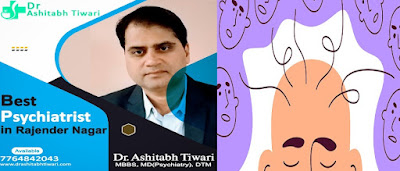Can You Pass the Best Psychiatrist in Rajinder Nagar Delhi Test?
Psychiatry is a field of medicine that deals with the diagnosis, treatment, and prevention of mental disorders. It requires extensive knowledge and training, and only those who have acquired the necessary qualifications and experience can call themselves psychiatrists. But what makes a great psychiatrist? And can you pass the test of being the best psychiatrist in Rajinder Nagar, Delhi?
Here are
some key traits and skills that are essential for any psychiatrist to possess:
Strong communication skills
The ability
to communicate effectively is crucial for any psychiatrist. They need to be
able to listen to their patients, ask the right questions, and provide clear
explanations of diagnoses and treatments. Good communication skills also
involve being empathetic, compassionate, and non-judgmental, as this helps to
build trust and rapport with patients.
Knowledge and expertise
Psychiatrists
need to have a strong foundation of knowledge and expertise in the field of
mental health. This includes understanding the different types of mental
disorders, their symptoms and causes, and the various treatment options
available. They also need to keep up to date with the latest research and
developments in the field, as this can impact the effectiveness of their treatments.
Good judgment and decision-making
skills
A great
psychiatrist needs to have good judgment and decision-making skills. They need
to be able to make informed decisions about patient care and treatment,
weighing up the potential risks and benefits of different options. This
involves being able to think critically, analyze data, and consider the
individual needs and preferences of each patient.
Emotional intelligence
Emotional
intelligence refers to the ability to recognize, understand, and manage one's
own emotions, as well as the emotions of others. This is a crucial skill for
psychiatrists, as they need to be able to navigate the complex emotional
landscape of mental health disorders. They also need to be able to provide
emotional support and guidance to their patients, and help them to develop the
skills to manage their own emotions.
Patience and resilience
Dealing with
mental health disorders can be challenging and emotionally taxing. It requires
a great deal of patience and resilience to work with patients who may be
resistant to treatment or experiencing severe symptoms. A great psychiatrist needs to be
able to remain calm and composed in difficult situations, and have the
resilience to bounce back from setbacks and challenges.
Cultural sensitivity
Mental
health disorders can affect people from all walks of life, and it's important
for psychiatrists to be culturally sensitive and aware of different cultural
norms and values. This involves understanding the impact of culture and ethnicity
on mental health, and being able to adapt treatment plans to suit the individual
needs of each patient.
So, can you
pass the test of being the best psychiatrist in Janakpuri?
Here are some questions to ask yourself:
How well do you communicate with your
patients?
Do you
actively listen to your patients and provide clear explanations of diagnoses
and treatments? Are you able to build trust and rapport with your patients? Do
you have strong written and verbal communication skills?
How extensive is your knowledge and
expertise?
Do you have
a strong foundation of knowledge in the field of mental health? Are you up to
date with the latest research and developments? Do you have expertise in
particular areas of mental health, such as mood disorders or personality
disorders?
How good are your judgment and
decision-making skills?
Are you able
to make informed decisions about patient care and treatment? Do you take a
holistic approach, considering the individual needs and preferences of each patient?
Are you able to think critically and analyze data?
How well do you manage your own
emotions?
Are you able
to recognize, understand, and manage your own emotions effectively? Do you have
the ability to provide emotional support and guidance to your patients? Do you
have strong interpersonal skills?




Comments
Post a Comment